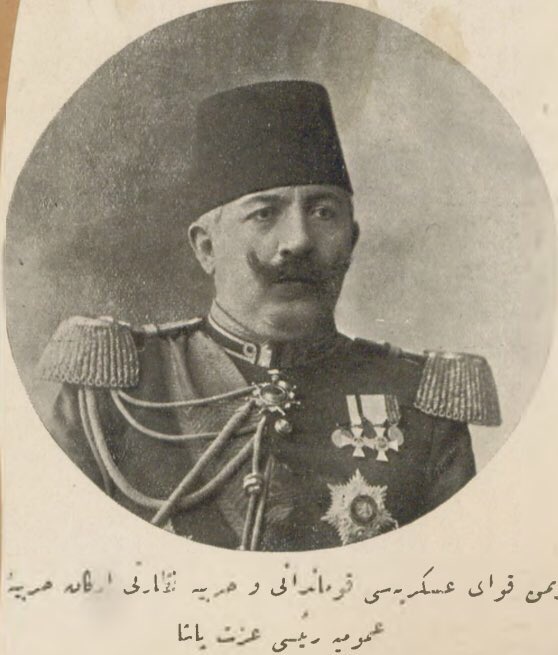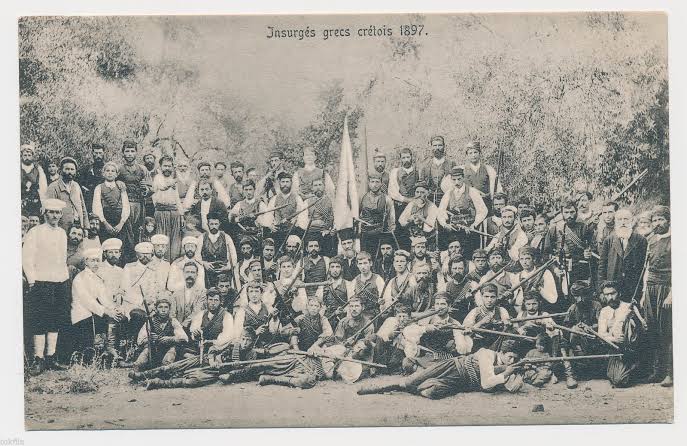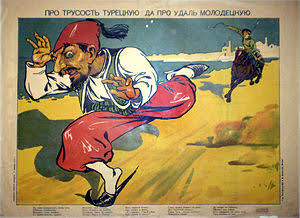//Ed. note: Ahmed İzzet Paşa had quite an illustrious and
eventful career as an Ottoman soldier. In this piece, he
recounted his personal involvement in the battles in
Thessaly during the Turkey-Greece War of 1897, while
at a conference in Istanbul in 1909.
In 1918, when Turkey accepted the terms of surrender
in World War I on the island of Mondros in the north
Aegean Sea, Ahmed İzzet Paşa was the Ottoman Prime
Minister, having reluctantly accepted the job after the
ruling 'triumverate' of Enver, Cemal and Talat had fled.
Ahmet İzzet's tenure as PM lasted 25 days, during which
time he was mostly bedridden with the Spanish flu.//
Ahmed İzzet Paşa's biography click here for details.

Army Chief of Staff Ahmet İzzet Paşa
Military Conference: Ottoman - Greek Expedition
eventful career as an Ottoman soldier. In this piece, he
recounted his personal involvement in the battles in
Thessaly during the Turkey-Greece War of 1897, while
at a conference in Istanbul in 1909.
In 1918, when Turkey accepted the terms of surrender
in World War I on the island of Mondros in the north
Aegean Sea, Ahmed İzzet Paşa was the Ottoman Prime
Minister, having reluctantly accepted the job after the
ruling 'triumverate' of Enver, Cemal and Talat had fled.
Ahmet İzzet's tenure as PM lasted 25 days, during which
time he was mostly bedridden with the Spanish flu.//
Ahmed İzzet Paşa's biography click here for details.

Army Chief of Staff Ahmet İzzet Paşa
Military Conference: Ottoman - Greek Expedition
Narrator: Chief of the General Staff General Ahmed İzzet (Forguç)
Military Library - İbrahim Hilmi
46 Bab-i âli Avenue
1325 (1909)
Islam and Military Library
Tüccarzade İbrahim Hilmi
Matbaa-i Artin Asadurian and Sons (printer)
Military Library - İbrahim Hilmi
46 Bab-i âli Avenue
1325 (1909)
Islam and Military Library
Tüccarzade İbrahim Hilmi
Matbaa-i Artin Asadurian and Sons (printer)
On Friday night, the 20th of March 1909, Army Chief of Staff General
Ahmed İzzet gave a lecture on the "Tesalya (Thessaly) War" at the
Istanbul Officers Club:
Ahmed İzzet gave a lecture on the "Tesalya (Thessaly) War" at the
Istanbul Officers Club:
Because of the press of business, there was not enough time to prepare
for the conference. Nevertheless, neither could I refuse the wishes of
my valued colleagues. As everyone knows, recounting an expedition
in all its details from start to finish in two hours time would be like
writing the Fatiha (opening chapter of the Koran) on a grain of rice.
Consequently, I must be content to relate some specific criticisms and
observations that I consider important, while leaving the details of
some military engagements aside.
There were two reasons for the Thessaly expedition. One reason is
rather obscure and must be sought in deep Ottoman history. The other
reason stems from events of the time.
for the conference. Nevertheless, neither could I refuse the wishes of
my valued colleagues. As everyone knows, recounting an expedition
in all its details from start to finish in two hours time would be like
writing the Fatiha (opening chapter of the Koran) on a grain of rice.
Consequently, I must be content to relate some specific criticisms and
observations that I consider important, while leaving the details of
some military engagements aside.
There were two reasons for the Thessaly expedition. One reason is
rather obscure and must be sought in deep Ottoman history. The other
reason stems from events of the time.
When the Ottoman fighters first invaded the European continent they
left the resident Christian populace alone, in the sense that there was
no infringement of their religion and customs, no attempts to convert
them to Islam by the sword. This was because Islam and humaneness
demand this. The old Ottomans ruled the people they subjugated with
justice, which persuaded the local populace to warm up to them. The
Christian peoples under Ottoman rule became so attached to our
forefathers that they joined them in battles. For example, it is well
known that the Serbs with Sultan Beyazid in his battle with Timur
put up more resistance than the Sultan's Turks did.

State-of-play in 1897.
Later, though, as Christians experienced injustice under the Ottomans
they began to break away from us, gradually rising up and forming
in groups to separate themselves from the Ottoman administration.
With regard to the area we are now discussing they formed
the "Etniki Eterya" (Ethnic Band) society and, ultimately, with the
help of the European powers, an independent Greek government
emerged. But they did not refrain from trying to expand their borders
and so the threat of war with us became permanent. These are the
hidden reasons for the Thessaly War.
As you all know, because of the Armenian incidents, the Ottoman State
was held in low regard by Europe in those days. Greece was intent on
capitalizing on the European enmity toward us and found its vehicle in
Crete, to where they sent soldiers when the revolt began. Using the
internal revolt on the island of Crete, a part of the Ottoman State for
which Greece had no connection whatsoever, as the excuse to send
troops became a blatent act of war against us.
As the result, both sides began massing troops. Greece's choice of this
moment for a war could be considered right on the mark, since all of
Europe agreed that an armed revolt against the Ottoman administration
that they considered abhorant was justified, so the Greeks could expect
support from the European states.

Greek rebels on Crete in 1897.
left the resident Christian populace alone, in the sense that there was
no infringement of their religion and customs, no attempts to convert
them to Islam by the sword. This was because Islam and humaneness
demand this. The old Ottomans ruled the people they subjugated with
justice, which persuaded the local populace to warm up to them. The
Christian peoples under Ottoman rule became so attached to our
forefathers that they joined them in battles. For example, it is well
known that the Serbs with Sultan Beyazid in his battle with Timur
put up more resistance than the Sultan's Turks did.
State-of-play in 1897.
Later, though, as Christians experienced injustice under the Ottomans
they began to break away from us, gradually rising up and forming
in groups to separate themselves from the Ottoman administration.
With regard to the area we are now discussing they formed
the "Etniki Eterya" (Ethnic Band) society and, ultimately, with the
help of the European powers, an independent Greek government
emerged. But they did not refrain from trying to expand their borders
and so the threat of war with us became permanent. These are the
hidden reasons for the Thessaly War.
As you all know, because of the Armenian incidents, the Ottoman State
was held in low regard by Europe in those days. Greece was intent on
capitalizing on the European enmity toward us and found its vehicle in
Crete, to where they sent soldiers when the revolt began. Using the
internal revolt on the island of Crete, a part of the Ottoman State for
which Greece had no connection whatsoever, as the excuse to send
troops became a blatent act of war against us.
As the result, both sides began massing troops. Greece's choice of this
moment for a war could be considered right on the mark, since all of
Europe agreed that an armed revolt against the Ottoman administration
that they considered abhorant was justified, so the Greeks could expect
support from the European states.
Greek rebels on Crete in 1897.
However, Greek atrocities committed on Crete had a stifling effect on
their hopes, with European states with connection to Crete condemning
these Greek actions that violated international norms. Nevertheless,
the Greeks still considered that the Latin and Slavic peoples and
governments of Europe favored them. In this regard, the slogan
"there is no place for the crescent where the cross has gone" could be
heard in European cabinets. The Greeks took this to be permission for
them to pursue their cause.
their hopes, with European states with connection to Crete condemning
these Greek actions that violated international norms. Nevertheless,
the Greeks still considered that the Latin and Slavic peoples and
governments of Europe favored them. In this regard, the slogan
"there is no place for the crescent where the cross has gone" could be
heard in European cabinets. The Greeks took this to be permission for
them to pursue their cause.
To what could this situation be attributed? Was Europe this bigoted?
Was it returning to the time of the Crusades? Yet, it had been just a
half-century before, when this bigotry was even more pronounced, that
the Europeans supported us against the Orthodox Christian Russians,
sending their armies to fight alongside us in the Crimean War. And
how does one explain English support for Japan in its recent war
against Russia, with regard to this Christian bigotry?

In my humble opinion, this bigotry was reserved especially for us.
The consequence of some (Moslem) activities done in the name of
zealotry, was that biogotry against us was re-ignited in Europe.
Thankfully, the well-intentioned unity of various peoples during the
most recent insurrection proved that religious enmity is a one-sided
phenomenon. For the preservation of our future we must refute
bigotry. It is of the utmost importance that biogtry not be mixed in
with politics, so that both the sanctity of religion and the administration
of justice are preserved.
In a few months we will accept soldiers from among our Christian
citizens. At that time we must all bear in mind the importance of this
point. I am absolutely certain that we will successfully perform our
duty in a humane and civilized manner, in such a way that it will reflect
well on our forefathers who bequeathed this country to our care.
//END of PART I//
Was it returning to the time of the Crusades? Yet, it had been just a
half-century before, when this bigotry was even more pronounced, that
the Europeans supported us against the Orthodox Christian Russians,
sending their armies to fight alongside us in the Crimean War. And
how does one explain English support for Japan in its recent war
against Russia, with regard to this Christian bigotry?
In my humble opinion, this bigotry was reserved especially for us.
The consequence of some (Moslem) activities done in the name of
zealotry, was that biogotry against us was re-ignited in Europe.
Thankfully, the well-intentioned unity of various peoples during the
most recent insurrection proved that religious enmity is a one-sided
phenomenon. For the preservation of our future we must refute
bigotry. It is of the utmost importance that biogtry not be mixed in
with politics, so that both the sanctity of religion and the administration
of justice are preserved.
In a few months we will accept soldiers from among our Christian
citizens. At that time we must all bear in mind the importance of this
point. I am absolutely certain that we will successfully perform our
duty in a humane and civilized manner, in such a way that it will reflect
well on our forefathers who bequeathed this country to our care.
//END of PART I//

Hiç yorum yok:
Yorum Gönder